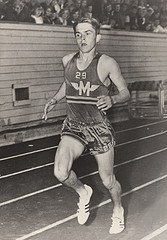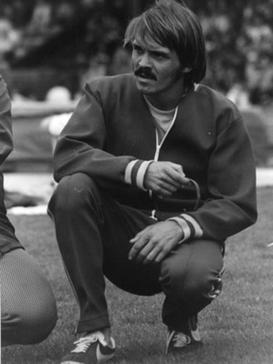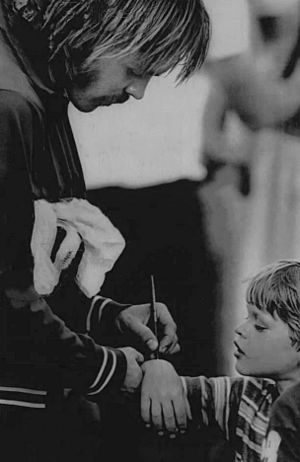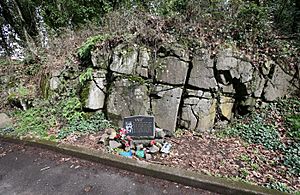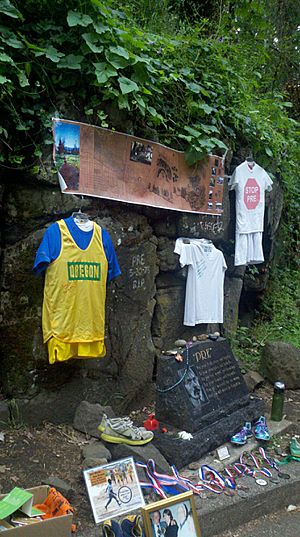Steve Prefontaine facts for kids
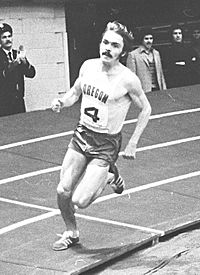
Prefontaine in 1973
|
|||||||||||
| Personal information | |||||||||||
|---|---|---|---|---|---|---|---|---|---|---|---|
| Nationality | American | ||||||||||
| Born | January 25, 1951 Coos Bay, Oregon |
||||||||||
| Died | May 30, 1975 (aged 24) Eugene, Oregon |
||||||||||
| Height | 5 ft 9 in (1.75 m) | ||||||||||
| Weight | 152 lb (69 kg) | ||||||||||
| Sport | |||||||||||
| Country | |||||||||||
| Sport | Athletics/Track, Long-distance running | ||||||||||
| Event(s) | 5000 meters, 10,000 meters, mile, 2 mile | ||||||||||
| College team | Oregon Ducks | ||||||||||
| Club | Oregon Track Club | ||||||||||
| Coached by | Bill Bowerman | ||||||||||
| Achievements and titles | |||||||||||
| Olympic finals | 1972 Munich 5000 m, 4th |
||||||||||
| Personal best(s) | |||||||||||
|
Medal record
|
|||||||||||
Steve Roland "Pre" Prefontaine (January 25, 1951 – May 30, 1975) was a famous American long-distance runner. From 1973 to 1975, he set American records in many distances, from 2,000 to 10,000 meters. He competed in the 1972 Summer Olympics. At the time of his death in 1975, he was training for the 1976 Olympics.
Prefontaine's exciting career, along with other runners like Frank Shorter, helped start the "running boom" of the 1970s. He died at age 24 in a car crash in Eugene, Oregon. A major track meet, the Prefontaine Classic, is held every year in Eugene to honor him. His fame and energetic personality also led to two movies about his life in the 1990s.
Contents
Early Life and Running Start
Steve Prefontaine was born on January 25, 1951, in Coos Bay, Oregon. His father, Raymond, was a welder who served in World War II. His mother, Elfriede, worked as a seamstress. Steve was the middle child and only son, with two sisters, Neta and Linda.
Steve was a very energetic kid. He loved to move and try different activities. In junior high, he played football and basketball. But he didn't get to play much because he was short.
In eighth grade, he saw high school cross country runners jogging past the football field. He thought it looked boring at first. Later that year, during a three-week fitness class, he found he was good at long-distance running. By the second week of daily mile runs, he could finish second. This new success made him love cross country running.
High School Running Success (1965–1969)
In the fall of 1965, Steve joined the cross country team at Marshfield High School. His coach, Walt McClure, Jr., had also run at the University of Oregon.
Steve's first two years were good. He ran the mile in 5:01 in his first year. By the end of his freshman year, he was the second-best runner on the team. His coach noticed his great potential during his sophomore year.
Following his coach's advice, Steve trained very hard over the summer. In his junior year, he won every cross country race and took home the state title.
In his senior year, Steve set big goals. He set a national record at the Corvallis Invitational, running 8:41.5. This was almost seven seconds faster than the old record. He won two more state titles that year, staying undefeated in both the one-mile and two-mile races.
Many colleges wanted Steve to join their teams. He received many calls and letters from coaches. Steve wanted to stay in Oregon and attend the University of Oregon. He didn't hear much from Bill Bowerman, the head coach at Oregon. Other universities, like Villanova, were very eager to recruit him.
Steve decided to go to the University of Oregon after reading a letter from Coach Bowerman. Bowerman wrote that he was "certain" Steve would become the world's greatest distance runner if he ran at Oregon. Steve was excited by this challenge.
College Career at Oregon (1970–1973)
Steve Prefontaine went to the University of Oregon to train with Coach Bill Bowerman. Bowerman was also a co-founder of Blue Ribbon Sports, which later became Nike.
At Oregon, Steve became famous for his aggressive running style. He would start fast and try to lead the whole race. He once said, "No one will ever win a 5,000 meter race by running an easy first two miles. Not against me." He also had amazing leg speed. His best mile time was 3:54.6, which was very close to the world record at that time.
Steve won four 5,000-meter titles in track. He also won three NCAA Cross Country Championships and four straight three-mile/5000-meter titles in track. He was a member of the Pi Kappa Alpha fraternity.
Fans at Hayward Field would often chant "Pre! Pre! Pre!" They wore T-shirts that said "LEGEND" or "GO PRE." Steve quickly became famous across the country. He appeared on the cover of Sports Illustrated when he was just 19.
1972 Summer Olympics
In 1971, Steve began training for the 1972 Summer Olympics in Munich. This was special for his family because his mother was German, and his parents had met in Germany.
At the 1972 Olympic Trials in Eugene, Steve set an American record in the 5,000 meters with a time of 13:22.8. At the Olympics in Munich, he was not expected to win. In the 5,000-meter final, he took the lead in the last mile. He pushed the pace, making the race much faster.
In the final lap, he was in second place. But with 200 meters left, he fell to third. Then, with only 10 meters to go, Britain's Ian Stewart passed him. Steve finished fourth, just missing out on an Olympic medal. He later said this was his most disappointing moment.
After the Olympics, Steve returned to the University of Oregon. He was even more determined to train harder. He often ran over 10 miles every morning before starting his day.
During his four years at Oregon, Steve never lost a college race at 3 miles, 5,000 meters, 6 miles, or 10,000 meters. He only lost three races in Eugene, all of them in the mile.
After college, Steve had a long disagreement with the Amateur Athletic Union (AAU). The AAU said that athletes who wanted to compete in the Olympics as "amateurs" could not be paid for appearing in track meets. This seemed unfair because the athletes attracted huge crowds and made a lot of money, but they had to pay all their own expenses. Steve was getting free clothes and shoes from Nike, which the AAU saw as a violation of their rules.
After College (1974–1975)
After finishing college, Steve prepared for the 1976 Summer Olympics in Montreal. While running for the Oregon Track Club, he set American records in every race from 2,000 to 10,000 meters.
In 1974, Steve gave a speech at a banquet in Eugene. He spoke about how important cross country running was to him. After he passed away, his notes from this speech were given to his family.
Death
In 1975, a group of Finnish athletes came to Eugene for a track meet. After the event on May 29, which Steve won, the athletes went to a party. Shortly after midnight, Steve left the party to drive a friend home.
He then drove alone on a narrow road called Skyline Boulevard. His gold 1973 MGB convertible went off the road, hit a rock wall, and flipped over. Steve was trapped underneath the car.
A nearby resident, Bill Alvarado, heard the crash and found Steve still alive but pinned. By the time medical help arrived, Steve had passed away. The official cause of death was traumatic asphyxiation, meaning he couldn't breathe because of how he was trapped.
Steve Prefontaine was buried in his hometown of Coos Bay. The day after his funeral, a memorial service was held at Hayward Field in Eugene, attended by thousands of people.
Aftermath and Legacy
Steve's death was a huge loss. He was one of the most popular athletes in Oregon. He was also seen as a key figure in starting the national "running boom" of the 1970s.
An annual track event, the Prefontaine Classic, has been held in his memory since 1975. It was renamed just two days after his death.
During his career, Steve won 120 out of 153 races. He never lost a college track race longer than one mile at the University of Oregon. In 2020, he was named one of the greatest male track and field athletes in the Pac-12 conference.
Memorials
Pre's Rock
Pre's Rock is a special memorial at the spot where Steve died. It's an engraved stone with his picture. It simply says:
"PRE"
Runners who are inspired by Steve leave things like race numbers, medals, and running shoes at the rock. This has become a tradition, especially during big running events in Eugene. Pre's Rock is seen as a special place for athletes and fans from all over the world.
Pre's Rock was officially dedicated in December 1997. It is now maintained as Prefontaine Memorial Park. The rock is about a mile east of Hayward Field.
Other Memorials
- A memorial featuring Steve's face and records is at the Coos Bay Visitor Center.
- In 2008, ten memorial plaques were placed along the Prefontaine Memorial Race route in Coos Bay. They show his high school picture and quotes.
- Every year, over a thousand runners take part in the Prefontaine Memorial Run, a 10k race in Coos Bay.
- The Coos Art Museum has a section dedicated to Steve. It includes his medals and the running spikes he wore when setting an American record.
- Steve was inducted into the Oregon Sports Hall of Fame in 1983 and the National Track and Field Hall of Fame.
- The track at Pete Susick Stadium at Marshfield High School was named in his honor in 2001.
- Nike has used videos of Steve in commercials and named a building at their headquarters after him.
- After his death, a poem called Ode to S. Roland was printed in the local newspaper.
- Steve remains a very important figure at the University of Oregon. In 2020, he was chosen as one of the four most iconic alumni by fans.
Personal Best Times
When Steve passed away in May 1975, he held every American outdoor track record from 2,000 to 10,000 meters. Here are his best times:
| Surface | Event | Time | Date | Location | Notes |
|---|---|---|---|---|---|
| Outdoor track |
1,500 m | 3:38.1 | June 28, 1973 | Helsinki | 11th-place finish |
| Mile | 3:54.6 | June 20, 1973 | Eugene | runner-up to Dave Wottle | |
| 2,000 m | 5:01.4 | May 9, 1975 | Coos Bay | American record | |
| 3,000 m | 7:42.6 | July 2, 1974 | Milan | American record | |
| Two miles | 8:18.3 | July 18, 1974 | Stockholm | American record | |
| Three miles | 12:51.4 | June 8, 1974 | Eugene | American record | |
| 5,000 m | 13:21.9 | June 26, 1974 | Helsinki | American record | |
| Six miles | 26:51.4 | April 27, 1974 | Eugene | American record (set during his 10,000 m record run) | |
| 10,000 m | 27:43.6 | April 27, 1974 | Eugene | American record |
Major Competition Results
Steve Prefontaine competed in many important races. Here are some of his notable performances and championships.
Notable Performances
| Year | Competition | Venue | Position | Event | Time | Notes |
|---|---|---|---|---|---|---|
| 1969 | US-USSR-Commonwealth Meet | Los Angeles | 5th | 5000 m | 14:40.0 | First international track meet |
| 1970 | Oregon Twilight Meet | Eugene, Oregon | 2nd | Mile | 3:57.4 | First time running under 4 minutes for the mile |
| 1971 | Pan American Games | Cali | 1st | 5000 m | 13:52.53 | |
| 1972 | US Olympic Trials | Eugene, Oregon | 1st | 5000 m | 13:22.8 | American record |
| Olympic Games | Munich | 4th | 5000 m | 13:28.4 | ||
| 1973 | Hayward Field Restoration Meet | Eugene, Oregon | 2nd | Mile | 3:54.6 | Personal best time |
| 1974 | Hayward Field Restoration Meet | Eugene, Oregon | 1st | 3 mile | 12:51.4 | American record |
| 1975 | NCAA Prep | Eugene, Oregon | 1st | 5000 m | 13:23.8 | His final race and 25th straight win in a distance over a mile |
US National Championships
| Year | Competition | Venue | Position | Event | Notes | |
|---|---|---|---|---|---|---|
| 1971 | AAU Track and Field Championships | Eugene, Oregon | 1st | 3 mile | 12:58.6 | First time running under 13 minutes for 3 miles |
| 1973 | AAU Track and Field Championships | Bakersfield, California | 1st | 3 mile | 12:53.4 | Broke his own meet record |
NCAA Championships
While at Oregon, Steve won seven national NCAA titles. He was the first athlete to win four NCAA track titles in the same event.
Cross Country
| Year | Competition | Venue | Position | Notes |
|---|---|---|---|---|
| Representing Oregon | ||||
| 1970 | NCAA Cross Country Championships | Williamsburg, Virginia | 1st | 28.00.2 |
| 1971 | NCAA Cross Country Championships | Knoxville, Tennessee | 1st | 29:14.0 |
| 1973 | NCAA Cross Country Championships | Spokane, Washington | 1st | 28:14.8 |
Track and Field
| Year | Competition | Venue | Position | Event | Notes | |
|---|---|---|---|---|---|---|
| Representing Oregon | ||||||
| 1970 | NCAA Outdoor Track and Field Championships | Drake Stadium (Des Moines, Iowa) |
1st | 3 mile | 13:22.0 | NCAA meet record |
| 1971 | NCAA Outdoor Track and Field Championships | Husky Stadium (Seattle, Washington) |
1st | 3 mile | 13:20.1 | |
| 1972 | NCAA Outdoor Track and Field Championships | Hayward Field (Eugene, Oregon) |
1st | 5000 m | 13:31.4 | NCAA meet record for 5000 m |
| 1973 | NCAA Outdoor Track and Field Championships | Bernie Moore Track Stadium (Baton Rouge, Louisiana) |
1st | 3 mile | 13:05.3 | Broke his own NCAA meet record |
Oregon State High School Championships
During his junior and senior years at Marshfield High School, Steve was undefeated in both cross country and track.
Cross Country
| Year | Competition | Venue | Position | Notes |
|---|---|---|---|---|
| Representing Marshfield High School | ||||
| 1967 | Oregon State Cross Country Championships | 1st | 12:13.8 | |
| 1968 | Oregon State Cross Country Championships | 1st | 11:30.2 | |
Track and Field
| Year | Competition | Venue | Position | Event | Notes |
|---|---|---|---|---|---|
| Representing Marshfield High School | |||||
| 1968 | Oregon State Track and Field Championships | Corvallis, Oregon | 1st | 2 mile | 9:02.7 |
| 1969 | Oregon State Track and Field Championships | Corvallis, Oregon | 1st | Mile | 4:08.4 |
| 1st | 2 mile | 9:03.0 | |||
Images for kids
See also
 In Spanish: Steve Prefontaine para niños
In Spanish: Steve Prefontaine para niños
 | Aurelia Browder |
 | Nannie Helen Burroughs |
 | Michelle Alexander |


